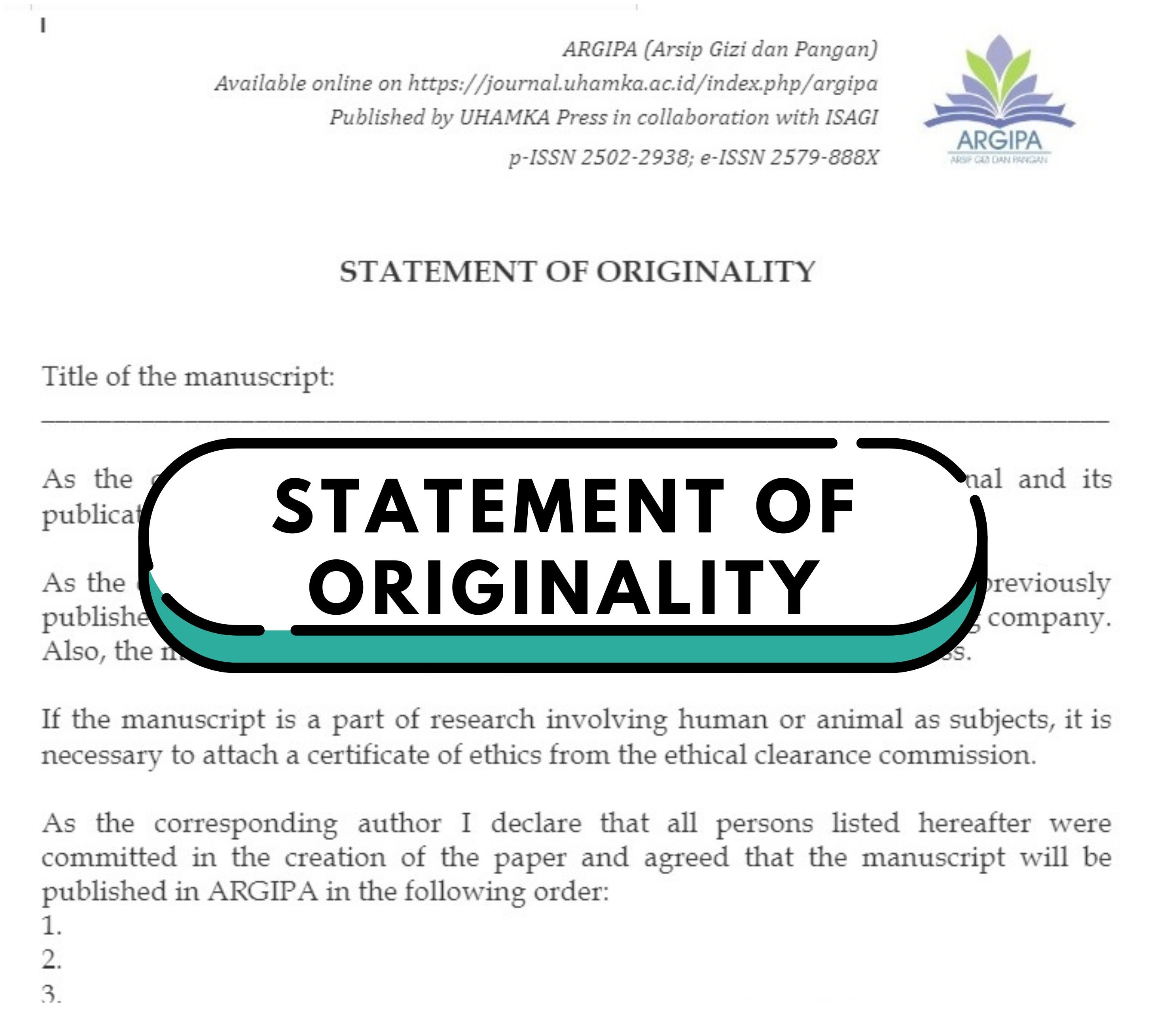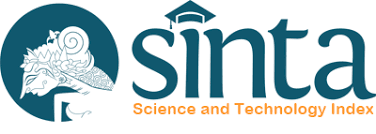Nutrition intake and cognitive functions of elderly women in Poslansia Subadra, Dramaga District, Bogor Regency
DOI:
https://doi.org/10.22236/argipa.v7i2.8177Keywords:
cognitive function, depression, elderly, fiber, folic acidAbstract
Alzheimer's disease is one of the leading causes of dementia caused by a progressive decline in cognitive function. In Indonesia, the incidence of Alzheimer's disease increases from year to year. Nutritional intake and physical activity are associated with a reduced risk of Alzheimer's disease. The objectives are to describe the intake of macronutrients, micronutrients, and cognitive function of the elderly and to analyze the relationship between intake of macronutrients and micronutrients with cognitive function. The research design used cross-sectional. The subject was 60 older women who met the inclusion criteria. The data collected in primary data include characteristics, intake of macronutrients, and micronutrients (fiber, folic acid, vitamin B12) using 24-hour Food Recall; cognitive function data using the Short Portable Mental Status Questionnaire depression level data using the Geriatric Depression Scale questionnaire. The relationship between nutritional intake and cognitive function was analyzed using the Spearman correlation test. The average intake of macronutrients except for fat and micronutrients of the subjects was in the lower category. There was a significant relationship between fiber and folic acid intake with cognitive function. As many as 53.33% of the elderly have a normal cognitive function, and the rest (46.67%) have impaired cognitive function, ranging from mild to severe. There is a significant relationship between fiber and folic acid intake with cognitive function. Fiber and folic acid intake must be increased to prevent cognitive decline in the elderly.Downloads
References
Alamsyah, P. R., & Andrias, D. R. (2017). Hubungan kecukupan zat gizi dan konsumsi makanan penghambat zat besi dengan kejadian anemia pada lansia. Media Gizi Indonesia, 11(1). https://doi.org/10.20473/mgi.v11i1.48-54
Angraini, D. I., Supartinah, A., & Wachid, D. N. (2013). Status kesehatan mulut dan asupan makan sebagai faktor risiko underweight pada lansia. Jurnal Gizi Klinik Indonesia, 9(4). https://doi.org/10.22146/ijcn.18367
Astutik, N. D. (2018). Kognitif, lansia, kualitas hidup pengaruh fungsi kognitif terhadap kualitas hidup lansia di Posyandu Lansia Srikandi Kelurahan Gadingkasri Kecamatan Klojen Malang. Jurnal Keperawatan Malang, 2(2), 90–94. https://doi.org/10.36916/jkm.v2i2.29
Benavides-Caro, C. A. (2017). Cognitive impairment in the elderly. Revista Mexicana de Anestesiologia, 40(2). https://doi.org/10.3389/fnagi2016.00253
Berding, K., Carbia, C., & Cryan, J. F. (2021). Going with the grain: Fiber, cognition, and the microbiota-gut-brain-axis. Experimental Biology and Medicine, 246(7), 796–811. https://doi.org/10.1177/1535370221995785
Blasko, I., HInterBerger, M., Kemmler, G., JungwIrtH, S., Krampla, W., Leitha, T., HeInz Tragl, K., & FIscHer, P. (2012). Conversion from mild cognitive impairment to dementia: Influence of folic acid and vitamin b12 use in the vita cohort. Journal of Nutrition, Health and Aging, 16(8). https://doi.org/10.1007/s12603-012-0051-y
BPS. (2020). Statistik Penduduk Lanjut Usia 2020.
Brogan, K. E., & Jen, K. L. C. (2010). Nutrition in the Elderly. In Handbook of Assessment in Clinical Gerontology. https://doi.org/10.1016/B978-0-12-374961-1.10014-4
Brown, J. E. (2011). Nutrition Through the Life Cycle, 4th Ed. In Fluoride.
Coşar, A., Ipçioǧlu, O. M., Özcan, Ö., & Gültepe, M. (2014). Folate and homocysteine metabolisms and their roles in the biochemical basis of neuropsychiatry. In Turkish Journal of Medical Sciences (Vol. 44, Issue 1). https://doi.org/10.3906/sag-1211-39
Dewi, S., & Hidayati, H. (2020). Faktor dukungan keluarga dengan ke4jadian depresi pada lansia. JURNAL STAMINA, 3(9). https://doi.org/10.24036/jst.v3i9.609
Doets, E. L., Ueland, P. M., Tell, G. S., Vollset, S. E., Nygård, O. K., Van’t Veer, P., et al. (2014). Interactions between plasma concentrations of folate and markers of vitamin B12 status with cognitive performance in elderly people not exposed to folic acid fortification: The Hordaland Health Study. British Journal of Nutrition, 111(6). https://doi.org/10.1017/S000711451300336X
Enderami, A., Zarghami, M., & Darvishi-Khezri, H. (2018). The effects and potential mechanisms of folic acid on cognitive function: a comprehensive review. In Neurological Sciences (Vol. 39, Issue 10). https://doi.org/10.1007/s10072-018-3473-4
Fadillah, W., & Rachmawati, I. N. (2013). Tingkat depresi pada lansia yang tinggal dengan keluarga (The depression in the elderly living with family). 1–11.
Fatma. (2010). Gizi Usia Lanjut. Jakarta: Penerbit Erlangga.
Gibson, R. S. (2005). Principles of Nutritional Assessment - Rosalind S. Gibson - Google Books. Oxford University Press.
Gugun, A. M. (2008). Hiperhomosisteinemia dan faktor risiko kelainan vaskuler. In Mutiara Medika (Vol. 8, Issue 2, pp. 97–105).
Hama, Y., Hamano, T., Shirafuji, N., Hayashi, K., Ueno, A., Enomoto, S., et al. (2020). Influences of folate supplementation on homocysteine and cognition in patients with folate deficiency and cognitive impairment. Nutrients, 12(10). https://doi.org/10.3390/nu12103138
Hu, N., Yu, J., Tan, L., Wang, Y., Sun, L., & Tan, L. (2013). Nutrition and the Risk of Alzheimer ’ s Disease.
Julianto, D., & Utari, P. A. (2019). Analisa pengaruh tingkat pendidikan terhadap pendapatan individu di Sumatera Barat. Ikra-Ith Ekonomika.
Karstens, A. J., Tussing-Humphreys, L., Zhan, L., Rajendran, N., Cohen, J., Dion, C., et al. (2019). Associations of the Mediterranean diet with cognitive and neuroimaging phenotypes of dementia in healthy older adults. American Journal of Clinical Nutrition, 109(2), 361–368. https://doi.org/10.1093/ajcn/nqy275
Kemenkes RI. (2016, March 10). Menkes: Lansia yang Sehat, Lansia yang Jauh dari Demensia.
Kemenkes.Go.Id. https://www.kemkes.go.id/article/view/16031000003/menkes-lansia-yang-sehat-lansia-yang-jauh-dari-demensia.html
Kushargina, R., & Afifah, A. N. (2021). Gambaran Tingkat Kecukupan Gizi Lansia dengan Depresi di Kecamatan Pondok Jagung. Muhammadiyah Journal of Nutrition and Food Science (MJNF), 2(1), 24. https://doi.org/10.24853/mjnf.2.1.24-31
Kwok, T., Wu, Y., Lee, J., Lee, R., Yung, C. Y., Choi, G., et al. (2020). A randomized placebo-controlled trial of using B vitamins to prevent cognitive decline in older mild cognitive impairment patients. Clinical Nutrition, 39(8). https://doi.org/10.1016/j.clnu.2019.11.005
Li, M., Li, W., Gao, Y., Chen, Y., Bai, D., Weng, J., et al. (2021). Effect of folic acid combined with docosahexaenoic acid intervention on mild cognitive impairment in elderly: a randomized double-blind, placebo-controlled trial. European Journal of Nutrition, 60(4). https://doi.org/10.1007/s00394-020-02373-3
Liew, S. C. (2016). Folic acid and diseases - Supplement it or not? In Revista da Associacao Medica Brasileira (Vol. 62, Issue 1). https://doi.org/10.1590/1806-9282.62.01.90
Liu, H., Li, W., Zhao, S., Zhang, X., Zhang, M., Xiao, Y., et al. (2016). Folic acid attenuates the effects of amyloid β oligomers on DNA methylation in neuronal cells. European Journal of Nutrition, 55(5). https://doi.org/10.1007/s00394-015-1002-2
Ma, F., Zhou, X., Li, Q., Zhao, J., Song, A., An, P., et al. (2019). Effects of Folic Acid and Vitamin B12, Alone and in Combination on Cognitive Function and Inflammatory Factors in the Elderly with Mild Cognitive Impairment: A Single-blind Experimental Design. Current Alzheimer Research, 16(7). https://doi.org/10.2174/1567205016666190725144629
Malouf, R., & Evans, J. G. (2008). Folic acid with or without vitamin B12 for the prevention and treatment of healthy elderly and demented people. In Cochrane Database of Systematic Reviews (Issue 4). https://doi.org/10.1002/14651858.CD004514.pub2
Mantzorou, M., Vadikolias, K., Pavlidou, E., Serdari, A., Vasios, G., Tryfonos, C., et al. (2020). Nutritional status is associated with the degree of cognitive impairment and depressive symptoms in a Greek elderly population. Nutritional Neuroscience, 23(3). https://doi.org/10.1080/1028415X.2018.1486940
Mao, X., Chen, C., Xun, P., Daviglus, M. L., Steffen, L. M., Jacobs, D. R., et al. (2019). Intake of vegetables and fruits through young adulthood is associated with better cognitive function in midlife in the US general population. Journal of Nutrition, 149(8), 1424–1433. https://doi.org/10.1093/jn/nxz076
Mazza, E., Fava, A., Ferro, Y., Rotundo, S., Romeo, S., Bosco, D., Pujia, A., & Montalcini, T. (2018). Effect of the replacement of dietary vegetable oils with a low dose of extravirgin olive oil in the Mediterranean Diet on cognitive functions in the elderly. Journal of Translational Medicine, 16(1), 1–10. https://doi.org/10.1186/s12967-018-1386-x
Mielech, A., Puścion-Jakubik, A., Markiewicz-żukowska, R., & Socha, K. (2020). Vitamins in alzheimer’s disease—review of the latest reports.[Vitaminas en la enfermedad de alzheimer: revisión de los últimos informes]. Nutrients, 12(11), 1–15.
Milte, C. M., Ball, K., Crawford, D., & McNaughton, S. A. (2019). Diet quality and cognitive function in mid-aged and older men and women. BMC Geriatrics, 19(1), 1–14. https://doi.org/10.1186/s12877-019-1326-5
Mooijaart, S. P., Gussekloo, J., Frölich, M., Jolles, J., Stott, D. J., Westendorp, R. G. J., & De Craen, A. J. M. (2005). Homocysteine, vitamin B-12, and folic acid and the risk of cognitive decline in old age: The Leiden 85-Plus Study. American Journal of Clinical Nutrition, 82(4). https://doi.org/10.1093/ajcn/82.4.866
Nasrun, M. W. (2010). Deteksi dini hendaya kognitif non demensia pada penyandang diabetes melitus tipe 2 pendekatan epidemiologi klinis, psikometrik dan spektroskopi resonansi magnetik. Perpustakaan FKUI.
Nieuwenhuizen, W. F., Weenen, H., Rigby, P., & Hetherington, M. M. (2010). Older adults and patients in need of nutritional support: Review of current treatment options and factors influencing nutritional intake. In Clinical Nutrition. https://doi.org/10.1016/j.clnu.2009.09.003
Novayanti, P. E., Adi, M. S., & Widyastuti, R. H. (2020). Tingkat Depresi Lansia yang Tinggal di Panti Sosial. Jurnal Keperawatan Jiwa, 8(2). https://doi.org/10.26714/jkj.8.2.2020.117-122
Pfeiffer, E. (1975). A Short Portable Mental Status Questionnaire for the Assessment of Organic Brain Deficit in Elderly Patients. Journal of the American Geriatrics Society, 23(10), 433–441. https://doi.org/10.1111/j.1532-5415.1975.tb00927.x
Prince, M., Ali, G. C., Guerchet, M., Prina, A. M., Albanese, E., & Wu, Y. T. (2016). Recent global trends in the prevalence and incidence of dementia, and survival with dementia. Alzheimer’s Research and Therapy, 8(1). https://doi.org/10.1186/s13195-016-0188-8
Putri, H. R., & Nindya, T. S. (2019). Hubungan Kecenderungan Depresi dengan Status Gizi pada Lansia di UPTD Griya Werdha Surabaya. Media Gizi Indonesia, 14(1).
Rakesh, G., Szabo, S. T., Alexopoulos, G. S., & Zannas, A. S. (2017). Strategies for dementia prevention: latest evidence and implications. Therapeutic Advances in Chronic Disease, 8(8–9), 121–136. https://doi.org/10.1177/2040622317712442
Ramassamy, C., & Belkacémi, A. (2011). Nutrition and alzheimer’s disease: Is there any connection? Current Alzheimer Research, 8(5), 443–444. https://doi.org/10.2174/156720511796391890
Saputro, S., Rustama, A., Sudarsana, D., Kusnandar, I., Istiqomah, N., Khoiriyah, S., Tantri, D., & Karyanta,
N. A. (2015). Analisis Kebijakan Pemberdayaan dan Perlindungan Sosial Lanjut Usia. In Coordinating Ministry for Human Development and Cultural Affairs Indonesia.
Setyowati, E., Iman Santosa, N., & Kridawati, A. (2019). Hubungan Asupan Vitamin B12 dan Asam Folat dengan Fungsi Kognitif Lansia. Jurnal Endurance, 4(1). https://doi.org/10.22216/jen.v4i1.2256
Simmons, J. M., Winsky, L., Zehr, J. L., & Gordon, J. A. (2021). Priorities in stress research: a view from the U.S. National Institute of Mental Health. Stress, 24(2). https://doi.org/10.1080/10253890.2020.1781084
Sofia, R., & Gusti, Y. (2017). Hubungan Depresi Dengan Status Gizi Lansia Di Panti Sosial Tresna Werdha Belai Kasih Bireuen. Jurnal Ilmiah Sains, Teknologi, Ekonomi, Sosial Dan Budaya, 1(1).
Warzyszynska, J. E., & Kim, Y.-I. J. (2014). Folate in Human Health and Disease. In eLS. https://doi.org/10.1002/9780470015902.a0002268.pub2
WHO. (2017). Global action plan on the public health response to dementia 2017 - 2025. Geneva: World Health Organization, 27. http://www.who.int/mental_health/neurology/dementia/action_plan_2017_2025/en/
Widajanti, L. (2009). Survei Konsumsi Gizi. Badan Penerbit Universitas Diponegoro.
Widyadharma, I. P. E., Tedyanto, E. H., Laksmidewi, A. A. A. P., Adnyana, M. O., & Samatra, D. P. G. P. (2020). Folic acid supplementation improves cognitive function: A systematic review. In Romanian Journal of Neurology/ Revista Romana de Neurologie (Vol. 19, Issue 4). https://doi.org/10.37897/RJN.2020.4.1

















